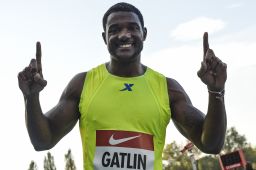Rio 2016 will be a miserable Olympics for Usain Bolt and Great Britain.
That’s if the predictions of Dutch company Infostrada come to pass.
The statistics firm tracks events around the world in all Olympic sports, then converts those results into a formula to predict who will win each Olympic medal.
At London 2012, Infostrada almost exactly forecast the British team’s total of 65 medals.
This time around, the latest update of its “virtual medal table” suggests the United States will once again lead the way, ahead of China, while Britain suffers a spectacular slump – and Bolt misses out on men’s 100m gold for the first time since 2004.
Team GB’s bosses have set a target of bettering their 65-medal tally from 2012. But Infostrada says they’ll do well to reach 45 in Rio.
“It’s bad news,” admits Simon Gleave, head of analysis at Infostrada Sports.
“GB is not going to perform anything like it did in London.
“We should expect a drop-off anyway, because London came with all sorts of advantages as the hosts, but this drop-off – as it stands – is quite large.”
Track cycling leaves a gaping hole in British medal hopes. Infostrada’s algorithm gives the Britons just one gold medal and two silvers in the Rio velodrome, in stark contrast to the seven Olympic titles won on their home track in 2012. Recent world championship failures are to blame.
In triathlon, a run of recent fourth-place finishes for defending Olympic champion Alistair Brownlee means he doesn’t even make the top three in 2016. His brother, Jonny, is forecast to pick up silver.
‘Bolt has competed in nothing’
That, however, pales in comparison to one huge absence at the top of the Rio podium.
Jamaican legend Bolt, 28, is predicted to miss out on Olympic 100m gold next year.
“We’ve got Bolt second at the moment, behind Justin Gatlin,” says Gleave.
Gatlin, the American who served a four-year drugs ban between 2006 and 2010, won bronze at London 2012 – where Bolt completed his second successive Olympic treble, winning 100m, 200m and 4x100m relay gold meals.
Bolt has dominated the 100m for the better part of a decade, winning the world titles in 2009 and 2013 alongside his two Olympic gold medals. Only in 2011, when he false-started, has he missed out.

So how come Infostrada doesn’t rate his chances?
“It’s because of the lack of events he has taken part in,” explains Gleave. “Bolt has competed in nothing that goes into this (formula) since 2013, whereas Gatlin has competed in a ton of events.”
In other words, Bolt’s preference for racing only on rare occasions earns him a penalty.
Gleave concedes that Bolt should, in reality, not be so easily written off – pointing out that Infostrada also had Bolt missing out on gold at London 2012, a prediction that was blown apart in an Olympic record time of 9.63 seconds.
If Bolt competes, as expected, at this summer’s World Championships in Beijing, a gold medal there would be likely to restore his place above Gatlin in the rankings.
“In a way, that’s what makes this nice,” says Gleave, defending the system. “It’s dynamic, it changes all the time.
“If someone returns to the top, we can watch that happening over the weeks and months before the Olympic Games starts.”
There’s better news for Michael Phelps.
The 29-year-old American, an 18-time Olympic champion, looked set to retire after London 2012 but has instead launched a comeback.
Despite few race appearances since 2012, his performances are strong enough for Infostrada’s formula to declare him a multiple medalist at Rio 2016 – if he qualifies.
McIlroy golden in golf
Team USA can look forward to topping the medal table with 97 medals, 47 of them gold.
That’s down slightly on a total of 104 medals at London 2012, but the gap to second place is actually forecast to widen with China’s performance set to weaken from 88 to 76 medals.
Russia – presently embroiled in a series of national doping scandals – is forecast to be third with 25 gold medals, slightly fewer than China’s 28, and 74 medals overall.
Infostrada removes any athlete whose doping ban will keep them from competing in Rio, but admits it is powerless to forecast the damage any future bans could do to Russian or other nations’ hopes.
Similarly, Infostrada combs its rankings to remove athletes who have retired. Extreme cases, like the deaths of two French Olympians in a recent helicopter crash, must also be accounted for.
Britain languishes in seventh with 10 gold medals, down from third in 2012 and a full four Olympic titles behind sixth-placed Australia.
British fans can take comfort from the knowledge that, while Infostrada demonstrated uncanny accuracy in predicting GB’s overall medal count in 2012, they were some distance off when it came to gold medals – Infostrada said 19, GB picked up 29.
Northern Irishman Rory McIlroy is forecast to win gold in 2016 based on his results in recent majors – however, he’s expected to do it for Ireland, the nation he would prefer to represent on golf’s Olympic debut.

Finally, how about next year’s hosts?
Infostrada believes the Brazilians are in line for 10 gold medals, by far the nation’s greatest Olympics yet, thanks to the host-nation advantage.
That includes two gold medals in volleyball, acknowledged by some reports as the most popular Olympic sport in Brazil.
You can also expect Brazilian winners in gymnastics, judo, sailing, swimming, long jump, and pole vault.
There’s just one problem for the hosts.
“We haven’t got them in football at the moment, men’s or women’s,” says Gleave.
“But that can change.”












